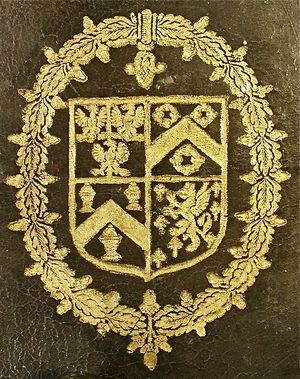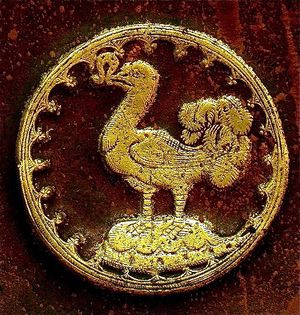Difference between revisions of "Edward Coke 1552-1634"
(Created page with "===personal Title::Sir name::Edward name::COKE date of Birth::1552-date of Death::1634=== ====Biographical Note==== Born at place of Birth::Mileham, No...") |
m (David moved page Sir Edward Coke to Edward Coke 1552-1634 without leaving a redirect) |
||
| (14 intermediate revisions by 3 users not shown) | |||
| Line 1: | Line 1: | ||
| − | ===[[personal | + | __NOTITLE__ |
| + | ===[[personal title::Sir]] [[name::Edward]] [[name::COKE]] [[date of birth::1552]]-[[date of death::1634]]=== | ||
| + | [[File:CokeEdwardSir2.jpg| thumb | Armorial stamp of Sir Edward Coke (British Armorial Bindings)]] | ||
| + | [[File:CokeEdwardSir3.jpg| thumb | Armorial stamp of Sir Edward Coke (British Armorial Bindings)]] | ||
| + | ====Biographical Note==== | ||
| + | Born at [[place of birth::Mileham, Norfolk]], son of [[family::Robert Coke]], a [[occupation::lawyer]] and landowner. Matriculated [[education::Trinity College, Cambridge]] 1567 but left in 1570 without graduating. Admitted [[organisations::Clifford’s Inn]] 1571, [[organisations::Inner Temple]] 1572; called to the Bar 1578, [[occupation::Reader]] at [[organisations::Lyon’s Inn]] 1579. During the 1580s and 90s Coke steadily advanced to become one of the most prominent and successful [[occupation::lawyer|lawyers]] of his generation, through skillful advocacy and expert presentation of his cases. He served as a [[occupation::recorder]] in several towns during this period, became [[occupation::Solicitor-General]] in 1592 and [[occupation::Attorney-General]] in 1593, promoted with the support of [[associates::William Cecil]]. He first entered the [[organisations::House of Commons]] in 1592 and served as an [[occupation::MP]] in numerous parliaments thereafter. Knighted by [[associates::James I]] in 1603. [[occupation::Vice-Chancellor]] of [[education:: University of Cambridge|Cambridge]], 1614. [[occupation::Chief Justice]] of the [[organisations::Court of Common Pleas]], 1606, of the [[organisations::Court of King’s Bench]] 1613. He increasingly fell foul of [[associates::James I]] through opposition to the King’s interference in the administration of justice and after a number of major disputes he was removed from the Bench in 1616. He was arrested and spent a short time in the [[organisations::Tower of London|Tower]] in 1622. During the early years of [[associates::Charles I]]’s reign he led opposition to the King’s policies through Parliament, and was closely involved with the presentation to [[associates::Charles I|Charles]] of the petition of right in 1628. After this he largely retired from public affairs and spent time in his last years [[author::compiling]] his [[book title::''Institutes of the laws of England'']], a codification of common law practice which was subsequently a hugely influential and respected cornerstone of [[location::England|English]] law. | ||
| − | ==== | + | ====Books==== |
| − | + | Coke assembled a substantial library of printed books and [[format::manuscript|manuscripts]]. A catalogue made shortly before his death in 1634 lists 1237 items, arranged by subject, suggesting the order in which they were shelved. The collection was wide ranging and as well as [[subject::law]] (ca. 16% of titles) included [[subject::theology]] (ca. 25%), [[subject::history]] and many other subjects. Coke acquired many books previously belonging to [[associates::Sir Christopher Hatton]] (d.[[date of death::1591]]) through his marriage to [[family::Elizabeth Coke|Elizabeth]], widow of [[associates::Sir William Hatton]] (d.[[date of death::1597]]); these included many [[language::Italian]] books. A substantial core of Coke’s collection (particularly [[subject::law]] books and [[language::Italian]] books) remains today at [[present repository::Holkham Hall]] in [[location::Norfolk]], [[family::the Coke family]] estate built in the 18th century by [[family::Thomas Coke]], Earl of Leicester, but many books have been dispersed over the centuries. A catalogue of the Holkham Library made in 1773 shows that many of the [[format::manuscript|manuscripts]] had been lost by then. Examples: many at Holkham Hall; BL ms Harl.6686-7; Cambridge UL Adams 6.58.5; NAL Clements EE4; Durham UL Cosin P.IV.19; Sotheby’s 13.6.1977/37; Quaritch 1370 (2008)/45. | |
| + | |||
| + | ====Characteristic Markings==== | ||
| + | Commonly inscribed his name on titlepages, sometimes adding the price paid. Occasionally annotated his books (26 [[subject::law|legal]] books at Holkham are noted by Hassall as carrying Coke’s annotations). Used 3 different armorial stamps (2 full armorials, the other the crest only); sometimes had “E C”, or his full name, tooled on the covers of bindings. | ||
| − | + | ====Sources==== | |
| + | <div id="sourcelist"> | ||
| + | *Boyer, Allen D. [https://doi.org/10.1093/ref:odnb/5826 "Coke, Sir Edward (1552–1634), lawyer, legal writer, and politician."] ''Oxford Dictionary of National Biography''. | ||
| + | *Hassall, W. ''A catalogue of the library of Sir Edward Coke'' (1950). | ||
| + | *Mortlock, D. ''Holkham Library: a history and description'', 2006. | ||
| + | *Rogers, D. The Holkham collection, ''Bodleian Library Record'' 4 (1953), 255-67. | ||
| + | </div> | ||
| − | + | {{DEFAULTSORT:Coke, Edward, Sir}} | |
| − | + | [[Category:Judges and Lawyers]] | |
| + | [[Category:Marginalia and Annotations]] | ||
| + | [[Category:Armorial Stamps]] | ||
| + | [[Category:Members of Parliament]] | ||
| + | [[Category:All Owners]] | ||
Latest revision as of 13:17, 29 June 2021
Sir Edward COKE 1552-1634
Biographical Note
Born at Mileham, Norfolk, son of Robert Coke, a lawyer and landowner. Matriculated Trinity College, Cambridge 1567 but left in 1570 without graduating. Admitted Clifford’s Inn 1571, Inner Temple 1572; called to the Bar 1578, Reader at Lyon’s Inn 1579. During the 1580s and 90s Coke steadily advanced to become one of the most prominent and successful lawyers of his generation, through skillful advocacy and expert presentation of his cases. He served as a recorder in several towns during this period, became Solicitor-General in 1592 and Attorney-General in 1593, promoted with the support of William Cecil. He first entered the House of Commons in 1592 and served as an MP in numerous parliaments thereafter. Knighted by James I in 1603. Vice-Chancellor of Cambridge, 1614. Chief Justice of the Court of Common Pleas, 1606, of the Court of King’s Bench 1613. He increasingly fell foul of James I through opposition to the King’s interference in the administration of justice and after a number of major disputes he was removed from the Bench in 1616. He was arrested and spent a short time in the Tower in 1622. During the early years of Charles I’s reign he led opposition to the King’s policies through Parliament, and was closely involved with the presentation to Charles of the petition of right in 1628. After this he largely retired from public affairs and spent time in his last years compiling his Institutes of the laws of England, a codification of common law practice which was subsequently a hugely influential and respected cornerstone of English law.
Books
Coke assembled a substantial library of printed books and manuscripts. A catalogue made shortly before his death in 1634 lists 1237 items, arranged by subject, suggesting the order in which they were shelved. The collection was wide ranging and as well as law (ca. 16% of titles) included theology (ca. 25%), history and many other subjects. Coke acquired many books previously belonging to Sir Christopher Hatton (d.1591) through his marriage to Elizabeth, widow of Sir William Hatton (d.1597); these included many Italian books. A substantial core of Coke’s collection (particularly law books and Italian books) remains today at Holkham Hall in Norfolk, the Coke family estate built in the 18th century by Thomas Coke, Earl of Leicester, but many books have been dispersed over the centuries. A catalogue of the Holkham Library made in 1773 shows that many of the manuscripts had been lost by then. Examples: many at Holkham Hall; BL ms Harl.6686-7; Cambridge UL Adams 6.58.5; NAL Clements EE4; Durham UL Cosin P.IV.19; Sotheby’s 13.6.1977/37; Quaritch 1370 (2008)/45.
Characteristic Markings
Commonly inscribed his name on titlepages, sometimes adding the price paid. Occasionally annotated his books (26 legal books at Holkham are noted by Hassall as carrying Coke’s annotations). Used 3 different armorial stamps (2 full armorials, the other the crest only); sometimes had “E C”, or his full name, tooled on the covers of bindings.
Sources
- Boyer, Allen D. "Coke, Sir Edward (1552–1634), lawyer, legal writer, and politician." Oxford Dictionary of National Biography.
- Hassall, W. A catalogue of the library of Sir Edward Coke (1950).
- Mortlock, D. Holkham Library: a history and description, 2006.
- Rogers, D. The Holkham collection, Bodleian Library Record 4 (1953), 255-67.

